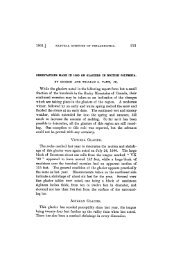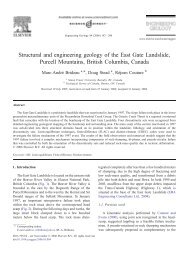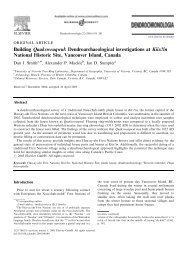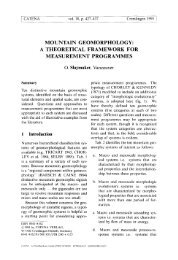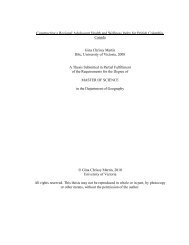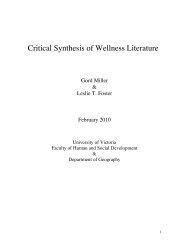Sustainable Food Production, Consumption, and the Generation of
Sustainable Food Production, Consumption, and the Generation of
Sustainable Food Production, Consumption, and the Generation of
Create successful ePaper yourself
Turn your PDF publications into a flip-book with our unique Google optimized e-Paper software.
variety <strong>of</strong> ways such as buying beverages in refillable bottles, reusing plastic bags, or source<br />
separating <strong>the</strong>ir waste (Minton & Rose, 1997).<br />
A variety <strong>of</strong> categories have been used within <strong>the</strong> research to identify consumer<br />
motivations for participating in waste reduction behaviour. Ebrero et al. (1999) have classified<br />
<strong>the</strong>se motivations as environmental altruism, social factors, nuisance factors, household factors,<br />
<strong>and</strong> economic factors. This comprehensive study found that recycling <strong>of</strong> almost all <strong>the</strong> materials<br />
presented to respondents was related to conservation attributes. These results show that recyclers<br />
believe that shopping in an ecologically conscious manner is important for conserving natural<br />
resources. It was found that <strong>the</strong> more concerned a person is for <strong>the</strong> environment, <strong>the</strong> more likely<br />
he/she was to purchase a product because it can be recycled or is made with recycled ingredients,<br />
to search for information about environmentally friendly products, <strong>and</strong> to recycle (Minton &<br />
Rose, 1997).<br />
Consumers’ belief that <strong>the</strong>y, as individuals, can help solve environmental problems was<br />
found to be an effective indicator <strong>of</strong> predicting ecologically conscious consumer behaviour<br />
(Roberts, 1996). Alternatively, a similar study found that respondent’s efforts to reduce waste<br />
were not affected by feelings <strong>of</strong> responsibility for generating waste (Minto & Rose, 1997).<br />
Overall, major finding’s from <strong>the</strong> literature show high awareness <strong>and</strong> participation among<br />
consumers to source separate <strong>and</strong> recycle <strong>the</strong>ir household waste. Although consumers,<br />
government, <strong>and</strong> industry acknowledge <strong>the</strong> growing urgency to reduce <strong>the</strong> current consumption<br />
<strong>and</strong> waste <strong>of</strong> packaged food products, ecologically conscious behaviour has not been as<br />
successful. Research has shown that despite <strong>the</strong> lower occurrence <strong>and</strong> awareness <strong>of</strong> o<strong>the</strong>r waste<br />
diversion strategies, consumers pre-existing perceptions <strong>and</strong> behaviour towards recycling can be<br />
a positive influence to adopt more ecologically conscious behaviour. As more consumers take<br />
an active role <strong>and</strong> responsibility for <strong>the</strong> production <strong>and</strong> consumption <strong>of</strong> food packaging waste,<br />
industry will be forced to comply with <strong>the</strong> consumer dem<strong>and</strong>s <strong>of</strong> producing more<br />
environmentally friendly packaging. Consumer behavioural changes can only be positively<br />
influenced with awareness <strong>and</strong> education <strong>of</strong> ecologically conscious alternatives to conventional<br />
consumptive patterns.<br />
3.4 <strong>Food</strong> packaging waste - Case study in Victoria, BC<br />
26




